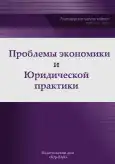Participation in Procedural Actions through Video Conferencing: Problems and Solutions, Prospects
- Authors: Shkhagapsoev Z.L.1, Kanunnikova N.G.1
-
Affiliations:
- North Caucasus Institute for Advanced Studies (branch) of the Krasnodar University of the Ministry of Internal Affairs of Russia
- Issue: Vol 18, No 3 (2022)
- Pages: 279-282
- Section: Articles
- URL: https://bakhtiniada.ru/2541-8025/article/view/147173
- ID: 147173
Cite item
Abstract
Full Text
##article.viewOnOriginalSite##About the authors
Zaurbi L. Shkhagapsoev
North Caucasus Institute for Advanced Studies (branch) of the Krasnodar University of the Ministry of Internal Affairs of Russia
Email: lel4993@mail.ru
Dr. Sci. (Law), Police Colonel, Chief Nalchik, Russian Federation
Natalia G. Kanunnikova
North Caucasus Institute for Advanced Studies (branch) of the Krasnodar University of the Ministry of Internal Affairs of Russia
Email: lel4993@mail.ru
Cand. Sci. (Law), Police Colonel, Head of the Department of State and Civil Law Disciplines Nalchik, Russian Federation
References
- Anufrieva E.A. Conducting interrogation, confrontation, identification using videoconferencing systems at the stage of preliminary investigation // Criminal proceedings: procedural theory and forensic practice. Materials X Int. scientific-practical. conf. Rep. editor M.A. Mikhailov. Simferopol, 2022.
- Arkhipova E.A. The use of video conferencing in criminal proceedings in Russia and foreign countries (comparative legal research): dis. … cand. legal Sciences. M., 2013.
- Dashkin A.V. The use of videoconferencing systems in criminal proceedings // Young scientist. 2018. No. 24 (210).
- Zheltobryukhov S.P. On the need to provide the body of preliminary investigation with the possibility of using videoconferencing at the stage of pre-trial proceedings // Russian Justice. 2016. No. 1.
- Kruzhilin N.P. Analysis of some aspects of the practice of interrogation and confrontation by video-conferencing (on the example of certain foreign states) // Law and power. 2022. No. 1.
- Kurochkina Yu.S. Problems of carrying out judicial actions of an investigative nature with the use of videoconferencing // Bulletin of the Kostroma State University. 2018. Vol. 24. No. 2.
- Martynov A.N., Kravets E.G., Shuvalov N.V. Organizational and tactical module of remote investigative actions // Criminological problems of law enforcement: works of the Academy of Management of the Ministry of Internal Affairs of Russia. 2017. No. 4 (44).
- Ovchinnikova O.V. Remote investigative actions: current state and prospects // Legal science and law enforcement practice. 2019. No. 1 (47).
- Plahota K.S. Features of the production of interrogation through the use of videoconferencing // Collection of materials of forensic readings. 2021. No. 18.
- Shcherba S.P., Arkhipova E.A. The use of video conferencing in criminal proceedings in Russia and foreign countries: experience, problems, prospects: monograph. M., 2016.
Supplementary files








